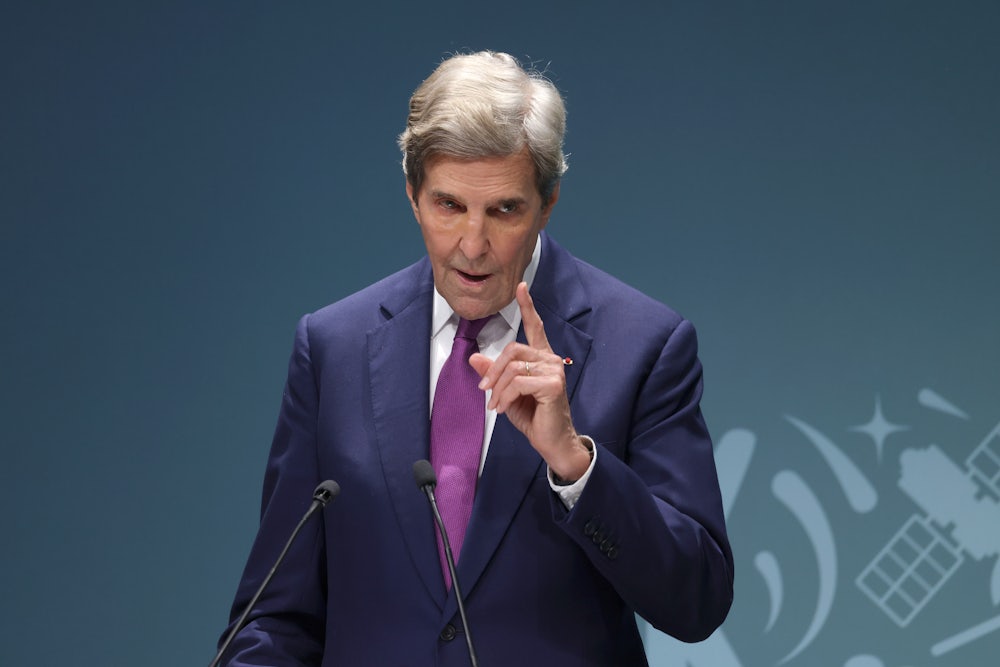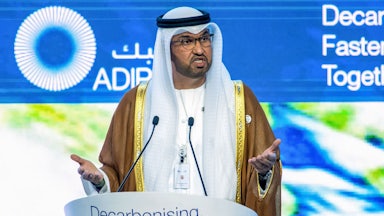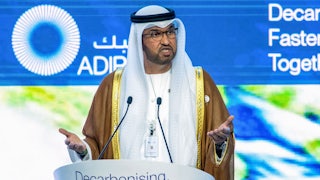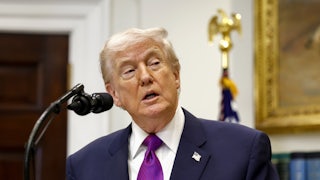As the U.N. climate talks in Dubai enter their final hours, negotiators have fixated on one particular term: fossil fuel phaseout. The United States has insisted that the final Global Stocktake, or GST—the document summarizing where we stand on implementing the goals of the Paris climate agreement and what should come next—include language about phasing out fossil fuels, albeit with plenty of caveats. The most recent draft of that text was released on Monday without those words. The State Department has said in response that the wording in the document “needs to be substantially strengthened” before talks conclude.
America’s biggest oil companies, meanwhile, are planning the precise opposite of a phaseout. ExxonMobil announced last week that it intends to increase overall oil production 11 percent to 3.8 million barrels of oil per day next year and then to 4.2 million by 2027, aiming to “more than double earnings potential” over that time period. In the next five years, 90 percent of Exxon’s capital expenditure will be devoted to the exploration and production of oil and gas. The company expects to spend $20 billion over the same time period on “lower-emissions opportunities,” which is also the same amount it aims to spend each year on share buybacks through 2025.
Chevron also announced last week that it plans to boost spending to between $18.5 billion to $19.5 billion next year, up from $17 billion this year. Growth for each company will focus on the Permian Basin, spanning West Texas and New Mexico.
The U.S. does not exercise direct control over its fossil fuel sector, relying instead on a subsidy and regulatory regime that was principally designed to encourage fossil fuel production. There are no laws on the books in the U.S. to intentionally limit the extraction of coal, oil, and gas. And while the Inflation Reduction Act includes several incentives for corporations and consumers to adopt wind and solar power and electric vehicles, U.S. climate policy does not explicitly target an overall reduction of fossil fuel demand. Democrats do not have the kind of filibuster-proof congressional majority that would allow them to pass policies that could proactively phase out fossil fuel demand or supply, and seem highly unlikely to obtain one for at least a decade.
U.S. climate envoy John Kerry has said that companies like Chevron and ExxonMobil “ought to be leading the charge” on the transition to renewable energy, and has expressed consternation at the fact that they aren’t. But there’s no evidence to suggest the Biden administration will do anything to slow or halt their growth plans. In fact, as the U.N. climate talks opened, they were holding an auction for oil and gas drilling rights on 44,000 acres of land in the western U.S.
Simply put: The U.S.—the world’s largest oil and gas producer and wealthiest country—has no plan to implement a phaseout of fossil fuels and scant prospects for developing one. U.S. negotiators in Dubai have been adamant, meanwhile, that just about every country on earth should agree to just such a phaseout.
Even the strongest possible wording included in a Global Stocktake could not mandate such a phaseout: The Paris Agreement is not a legally binding document. Countries are required to periodically resubmit their plans for meeting its goal to keep warming “well below” two degrees Celsius (3.6 degrees Fahrenheit), yet there are no tangible consequences for failing to follow through on those plans or setting weak targets.
The U.S., in other words, would like the rest of the world to agree to do something it cannot possibly do itself. It is by all accounts planning to speed in the opposite direction, with no plans to place any limits on the companies leading that charge. You’d be forgiven for thinking this situation doesn’t make any sense because it doesn’t.








